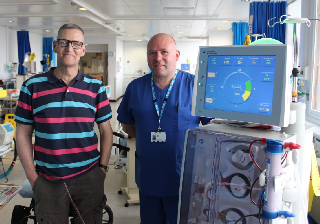|
New service focuses on
crucial dialysis stage

FIRST time dialysis patients on
Merseyside will be the first in the country to be given crucial 1 to 1
support in an innovative improvement project to help them through the difficult
1st stages of treatment.
The Royal Liverpool University Hospital's 'First Time Dialysis Project'
will
provide patient tailored education during the 1st 6 dialysis sessions to equip
them with information to make decisions about their own treatment.
Dialysis is used for patients who suffer from chronic kidney disease and is
normally carried out 3 times a week lasting for around 4 hours each time.
The 1st 90 days of dialysis are often the most critical, with patients' bodies
and minds adapting to new circumstances.
The 'First Time Dialysis Project', which will benefit the 150 patients who start
dialysis at the Royal each year, is supported by the Health Foundation, an
independent charity committed to bringing about better health and health care
for people in the UK. The project was selected following a highly competitive
national selection process.
As a regional specialist dialysis unit, the Royal treats around 100 patients
every day.
Dr Asheesh Sharma, consultant nephrologist and project lead, said:- "We've
worked with our patients to create a service that supports them through an
extremely difficult time. Chronic kidney disease is a life limiting condition
with outcomes that can be worse than some cancers. It has a huge impact upon
quality of life and patients are often under prepared to make decisions about
their treatment options. With this project, we want to make dialysis as stress
free as possible for our patients and their loved ones."
Dave Reid, 58, from Kirkby, underwent dialysis after suffering kidney failure
when he was 23. "When I found out I had kidney failure, I didn't know what
that meant, what my kidneys did or how it would affect my life. It's really
important to have a nurse with the time to talk you through what is happening
around you and catering the treatment specifically for you. Dialysis doesn't
just affect you, it affects your family, too, they see what you're going through
hooking up to the dialysis machine so often; they live it with you. This service
is incredibly important for them as well." |
